








BY ANDREA RIVERA Editor-in-Chief
As President Donald Trump begins his second term, his strong anti-immigration policies have begun to roll out.
In an announcement on Jan. 21, 2025, Acting Deputy Attorney General Emil Bove wrote that “Federal law prohibits state and local actors from resisting, obstructing, and otherwise failing to comply with lawful immigration-related commands or requests," according to the three-page memo sent to the U.S. Department of Justice employees.
The uncertainty of their safety has left some students with a sense of fear. In reporting this story, the Collegian found that while students were willing to talk, they were unwilling to share their names for fear they may be targeted for speaking out.
Collegian policy is generally to provide full source names, but students were granted anonymity for this article due to the political nature of the interviews.
“I think that’s just heartbreaking. I believe that everyone who lives here in the United States, specifically in California because you know it’s such a sanctuary state,” said one student. “I always feel at home here in California… I feel like no one should be punished for protecting the ones that they love.”
In anticipation of Trump’s anti-immigration policies, Delta College’s Board of Trustees voted on Dec. 17, 2024, to approve a resolution affirming the school’s status as a sanctuary campus dedicated to “providing educational opportunities for all” and “protecting the rights, dignity, and well-being of all students, including undocumented individuals, and ensuring their ability to pursue education without fear or barriers.”
The board, including three
new members sworn in that day, unanimously approved sanctuary designation for the campus.
The resolution also states that Delta College employees will not participate in activities or actions that remove undocumented students from campus.
“SJDC will uphold policies limiting cooperation with immigration authorities, including prohibiting Immigration and Customs Enforcement (ICE) officers from entering campus without a valid warrant and refusing to share information about students’ immigration status without a court order, ensuring that the campus remains a place of safety and learning for all,” according to the resolution.
Spanish Professor Ricardo Aguilar-Rodriguez said students and the community will feel safer with this policy.
“It’s a step, a great step … We are here for all students, whether they’re documented or undocumented. That’s the most important. Not only are we a sanctuary campus but our faculty and staff are here for them.”
The resolution has led to other conversations regarding Delta policies and immigration.
“From having conversations with colleagues, I know that there is a very real moment of wanting to protect our students. We’re going back and we’re doing evaluations to identify gaps so that we can address them. I think that evaluation is a really critical tool when we’re thinking about what systems we have in place,” said Digital Media Professor Adriana Brogger.
In regard to current Delta policies, Brogger said maybe some aren’t being enforced or are outdated. She said she believes if those gaps are addressed, students and faculty will have a better understanding of their rights.
In an effort to help clear some of those gaps, an emer-

gency meeting of the campus Policies and Procedures committee was held on Jan. 23. The meeting addressed Board Policy 5111 for student directory information and AP 3415 for immigration enforcement activities, policies first introduced at the Dec. 17 board meeting.
Under the Family Educational Rights and Privacy Act, no representative of the district is allowed to share information about student records to any member of the public without written consent from the student or a court order, lawfully issued subpoena or by federal or state laws.
However, information considered as “directory information” can be released unless specified by the student.
The policy would explicitly define directory information as “student participation in officially recognized activities and sports including weight, height, and high school of graduation for athletic team members. Degrees and awards received by students, including honors, scholarship awards,
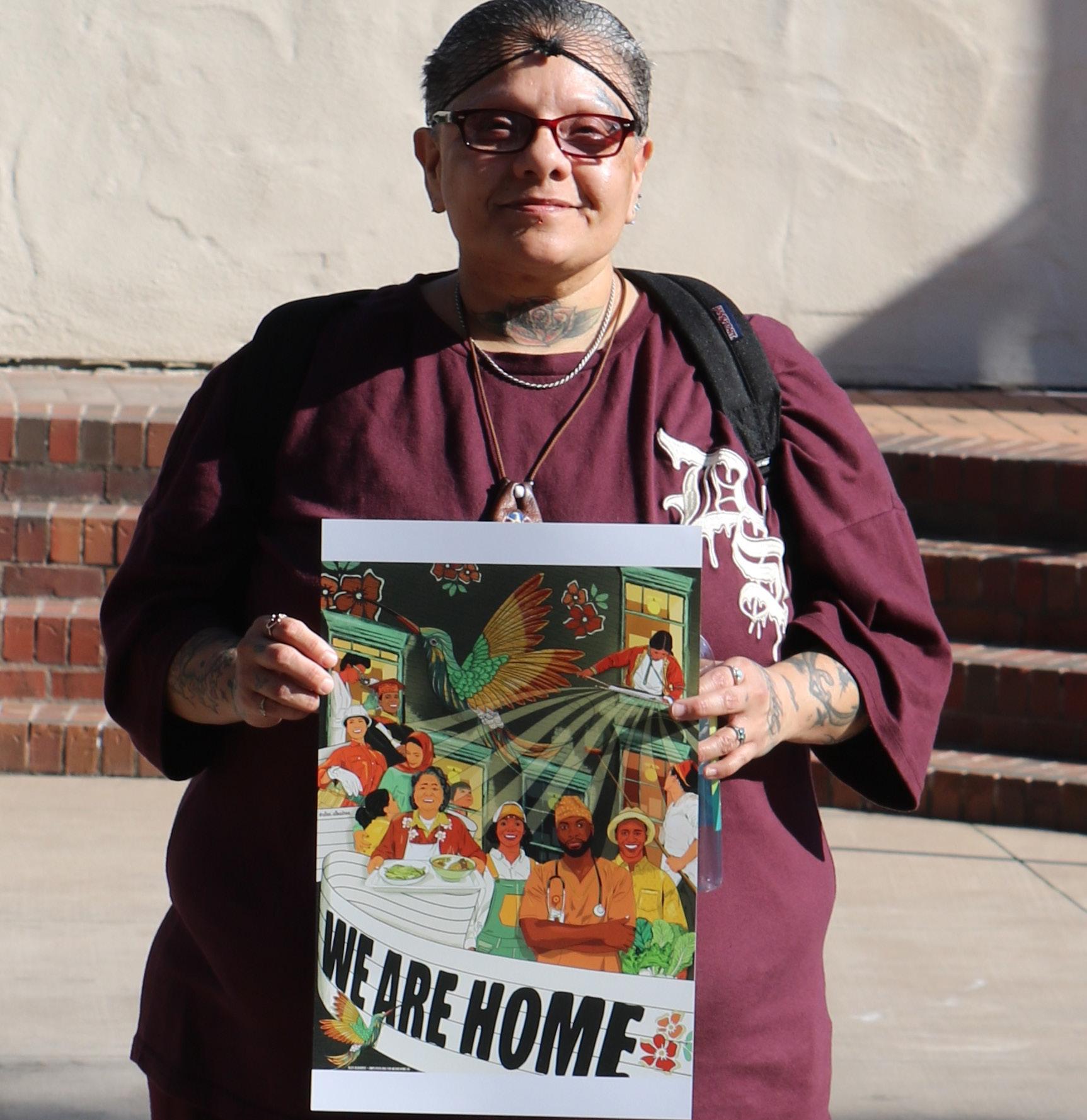
Welcome back students, 2025 is already swallowing us whole.
Trump’s now back in office and he’s moving fast. His hands have been getting busy signing off multiple executive orders and it’s only been a week since his inauguration.
Equity was never on Trump’s agenda.
Multiple executive orders target DEI — diversity, equity, and inclusion — policies and programs.
The rollback of these policies allows discrimination based on gender and ethnicity. It is important that anyone who is a U.S. resident is able to have job opportunities free from fear of harassment and discrimination. A person’s race, gender, sex, religion, or ability shouldn’t matter; everyone is striving to get by. We worked so hard to establish these policies — and now the policies are being abolished by the stroke of a pen?
Another executive order enforces anti-immigration policies. ICE agents are already invading public areas in Atlanta and Chicago.
On Jan. 27, a week past the inauguration, more than 100 people were detained in Chicago.
Delta College made the announcement last semester of declaring itself a sanctuary to protect students who are vul nerable to such actions.
On top of these stresses, and the already-hectic process of publishing a newspaper, another action “paused” federal grant funding, leading to a frenzied few days. This pause — which would potentially impact healthcare, financial aid, grants, loans, education and medical research — was rescinded via a two-sentence memo after a judge ordered a temporary restraining order against the policy.


The administration still claimed to be implementing the policy, leading another judge in a separate legal action to issue another restraining order. It seemed as though no one was able to get a grasp on what was actually going on. Events were developing so fast that it felt impossible to keep track of a single action, let alone the dozens that have been taken in Trump’s first week.
Chaos is the order of the day.
But on the bright side, Trump saved TikTok for another 75 days. Hooray.
The Collegian is the student newspaper of San Joaquin Delta College in Stockton, Calif. The paper is published six times a semester.
As a First Amendment newspaper we pride ourselves on a commitment to the students of Delta College while maintaining independence.
We reinvigorate the credo that the newspaper speaks for the students, checks abuses of power and stands vigilant in the protection of democracy and free speech.


The Collegian is a member of the
JELISSA
SENIOR
Delta has declared it will not dehumanize and not exclude any study on race, color, gender, religion, disability, and social status.
The American government is being kneecapped before our eyes, so how will the institution provide students support? If and/ or when federal funding is officially cut, will Delta be left an empty shell, unable to carry out its mission statement?
Unfortunately, more stressful, heart-wrenching days are to come with the Trump Administration. Our civil and basic human rights are at risk.
BY ANDREA BALTODANO Staff Writer
Confusion ruled the discussion this week after a memo from the Office of Management and Budget, published Tuesday evening, disclosed a two-week temporary suspension of federal agency grant, loan, and financial assistance programs, sparking concerns over its potential impact on education and workforce development.
“The use of Federal resources to advance Marxist equity, transgenderism, and green new deal social engineering policies is a waste of taxpayer dollars that does not improve the day-to-day lives of those we serve,” the memo’s first paragraph states.
While the OMB framed the freeze as an opportunity for program evaluations, legal challenges quickly followed. A federal judge issued an administrative stay, delaying the funding pause until Monday, Feb. 3.
on hold for now, but questions loom about what’s next
Delta College officials assesed how the proposal could affect campus programs.
“The OMB’s memo is broad. Exactly which grants, loans, and programs might be impacted is somewhat unclear as of this writing. Delta College is reviewing all federal grants and is awaiting further details on how this action will be implemented,” said President/ Superintendent Dr. Lisa Aguilera Lawrenson in a memo sent by Director of Marketing and Communications Alex Breitler campuswide late Tuesday afternoon.
Lawrenson’s memo notes that “the situation is very fluid and could change” but the college had been advised that the freeze did not “freeze all ‘across-the-board’ federal financial aid assistance” and does not “freeze benefits to Americans such as SNAP or student loans.”
SNAP is the Supplemental Nutrition Assistance Program. In 2022, more than 110,000 people received SNAP benefits in San Joaquin County, according to data from the U.S. Census Bureau.
Initial statements from the Department of Education suggested that student aid programs, including Pell Grants and Direct Loans, would not be affected.
“The temporary pause does not impact ‘assistance received directly by individuals.’ As such, Title IV, HEA funds that are provided to individual students, such as Federal Pell Grants and Direct Loans, are not impacted by yesterday’s guidance,” Madi Biedermann, spokesperson, told NBC News. However, the reassurance came into question later in the day when the OMB released a document listing all of the
federal programs that are currently under review as part of the pause. Career Technical Education (CTE), Migrant School Programs and Pell Grant appear on the list of affected programs.
An OMB Q&A document also stated that the pause is “expressly limited to programs, projects, and activities implicated by the President’s Executive Orders, such as ending DEI, the green new deal, and funding nongovernmental organizations that undermine the national interest.”
On Tuesday afternoon, just minutes before the pause was set to take effect, U.S. District Judge Loren L. AliKhan temporarily blocked the order following a lawsuit filed by nonprofit organizations that rely on federal funding. The ruling prevents the freeze from affecting existing programs until at least Monday, Feb. 3, while
legal challenges continue.
California Attorney General Rob Bonta joined a coalition of 23 state attorneys general in a lawsuit to block the freeze’s implementation, arguing that it would disrupt funding for critical programs.
For now, the legal challenges have put the freeze on a hold that allows schools and organizations to review potential impacts.
Delta College relies on federal funding for Pell grants with 27 percent of the student population receiving an average of $3,924, according to U.S News Education. The status of Career Technical Education programs remains unclear, as the college awaits for further updates.
As legal processes continue and federal agencies assess the situation, the extent of the funding freezes potential impact remains uncertain.
continued from PAGE 2
athletic awards, and Dean’s List recognition.”
AP 3415 would institute a policy directing students, faculty, and staff to notify the Office of the President/Superintendent if they are made aware of immigration enforcement activities on campus.
The policies were reviewed and immediately sent out to the campus community for a five-day comment period ending Jan. 30. The results of the meeting came after press time.
The policy proposal included an explanation of processes on how to approach different circumstances on how to handle an officer engaged in immigration enforcement, specifically with an immigration order.
“District personnel should not attempt to physically interfere with an officer, even if the officer appears to be acting without consent or exceeding the authorization given under a warrant or other document. District personnel shall make a record of the contact and forward the information to the Office of the President/Superintendent,” according to AP 3415.
However, getting this information out to students, faculty and the community has been a con-
cern amongst some faculty and students.
Brogger said the messaging by Delta hasn’t been clear enough after the board made the announcement.
“Ultimately what it means to me is that the educators, administrators, the staff at Delta College are going to be following California Ed code … the students on campus need to know in plain language what it means to be a sanctuary college,” said Brogger.
The Dreamers Success Center has resources to help all communities who are pursuing higher education, free legal and counseling services, mental health counseling and outside resources with connections too.
Resource Specialist in the Dreamers Success Center Tina Leal said she hopes students come in with any questions or concerns whether it be for themselves or for family.
“All information that I give out is strictly from an attorney's mouth … It 100 percent impacts the students to make sure that we are a sanctuary college and that we are putting these policies in place to protect our students… I work from the heart, it's a passion to just help everybody. What’s right is right,” said Leal.
President/Superintendent Dr. Lisa Aguilera Lawrenson sent a campuswide announcement through Director of Marketing and Communica-
tions Alex Breitler regarding Trump’s grant freeze and his administration’s immigration actions on Tuesday, Jan. 28 that notes the board’s recent resolutions and proposed actions.
“Effective immediately, if you are approached by an immigration agent please immediately direct that person to the Office of the Superintendent/President,” the memo advises.
Also noted is the development of SPARK, the Student Protection for Advocacy, Resources, and Knowledge, which will focus on “supporting vulnerable student populations.” The charter was on the agenda for the Thursday, Jan. 30, President’s Council meeting.
“I want to acknowledge the understandable worries and fears as these and other federal policies continue to emerge. Please remain calm and know that we will keep you up to date and do everything within our power to support our students, our employees, and our institution,” Lawrenson said to end the announcement. For more information about knowing your rights and the full reaffirmation of the sanctuary campus status please go to: ilrc.org/red-cards-tarjetas-rojas and deltacollege.edu/article/trustees-resolve-protect-rights-dignity-all-students
BY JOHN NGUYEN Staff Writer
The Stockton Unified School District’s African American/Black Parent Advisory Committee (AABPAC) and Extended Learning Opportunities Program (ELOP) hosted its third annual Martin Luther King Jr. Day Celebration at Delta on Jan. 17, three days before Martin Luther King Jr. Day.
“What we do is empower parents to be advocates for their students … They can actually push through the barriers that sometimes are created in the household with parenting and relationships, mental health,” said Karesha Boyd, vice president of the AABPAC and returning Delta student. “We just basically give them the resources to help their students thrive and accomplish their goals at the highest level possible.”
The theme for the event was “Dream Out Loud,” celebrating “different races, upbringings, backgrounds, traditions” according to ELOP director and the event emcee Mary Rogers.
“[Martin Luther King Jr.] dreamed out loud. He said his dream out loud where we can all hear it, and just for us to all be in the room where we’re all equal, where we’re sitting together, eating together, talking, laughing, interacting, loving on each other. That was a part of his dream,” said Rogers. “And being able to see that in this room was beyond inspirational.”
The celebration started with dinner from 3:30 p.m. to 4:30 p.m in Danner Hall. Stockton Unified School District’s Food Services and Catering Department brought in-house meals to serve hot for guests lining up at their table. Dishes included Cajun chicken, tritip steak, mac and cheese, peach crumble and more.
The Atherton Auditorium opened doors to guests after 4 p.m., where the Cesar Chavez High School Jazz Band was playing a pre-show.
The program started at 5 p.m., including introductions of the officers of ELOP, AABPAC, SUSD and Delta.
A Chavez vocalist and pianist also performed “Lift Every Voice and Sing,” or the “Black national anthem.”
The event directors’ segment of the program concluded with AABPAC’s recognition of High Five Awards for members of the community.
Student performances took over the program, starting with a poetry slam brought by Chavez, George W. Bush Elementary School and the Stockton-based With Our Words (WOW) Youth Poetry Collective. The poems referenced influential people to the civil rights movement like King, Mahatma Gandhi, Malcolm X, Rosa Parks and more.
“To get here, it took a lot … All of the civil rights activists … these are people who took steps forwards to progress society,” said Giovonni Tilley, WOW poet and a student at Delta. “As we’ve gone on, we’ve sort of forgotten how it used to be. And if we forget that, we very well may go back to the way it was.”
Poets then moved into the crowd, shortly acting out a 1960s walk-in protest chant with Marshall Elementary School students as they marched back out across the theater alongside drummers. Marshall followed
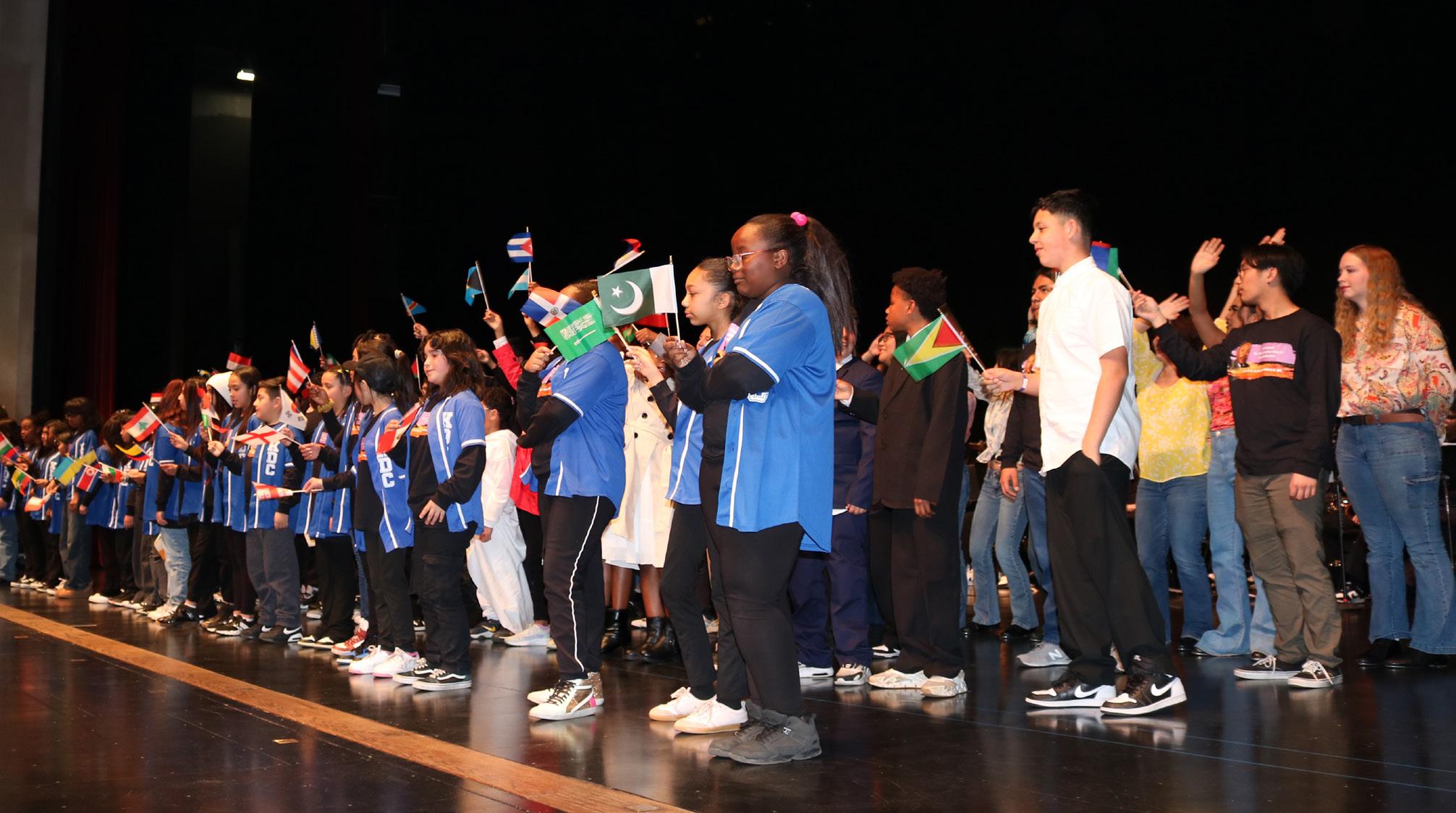
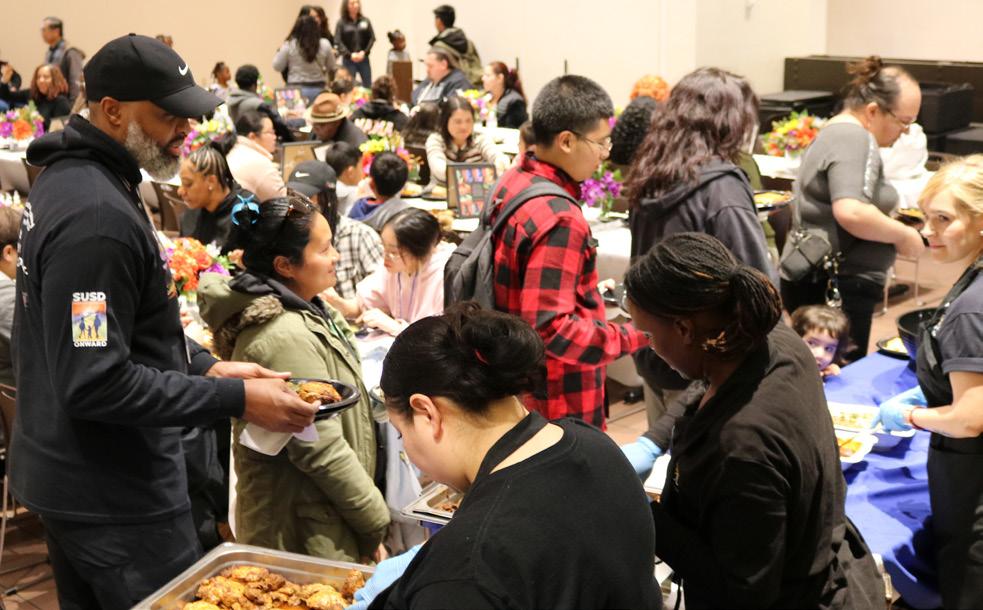
with a dance performance from the Marshall Steppers. Dances continued with be-bop to hip-hop from the KDC Dancers of Kennedy Elementary School.
The WOW poets came out for another slam about the hardships of King’s activist campaign for the civil rights movement. WOW poets joined female Chavez students for a slam about women that were figures in the Civil Rights movement including Josephine Baker and Coretta Scott King, acting out their memoirs. More Chavez students came out to perform a tap dance to Marvin Gaye’s “What’s Going On.”
“We wanted to introduce a figure from our community as African Americans that paved the way not only for African-Americans but for all people, because we need to remember — when black people fight, we open the doors for everyone,” said Boyd. “What they say, ‘equity is for all, equality is for all,’ and that’s what we’re looking for.”
All the program’s student performers came out to the stage, holding flags for each language represented by the SUSD. WOW poets gave speeches on hope in English, Spanish and Samoan while the other performers sang “We Are the World.”
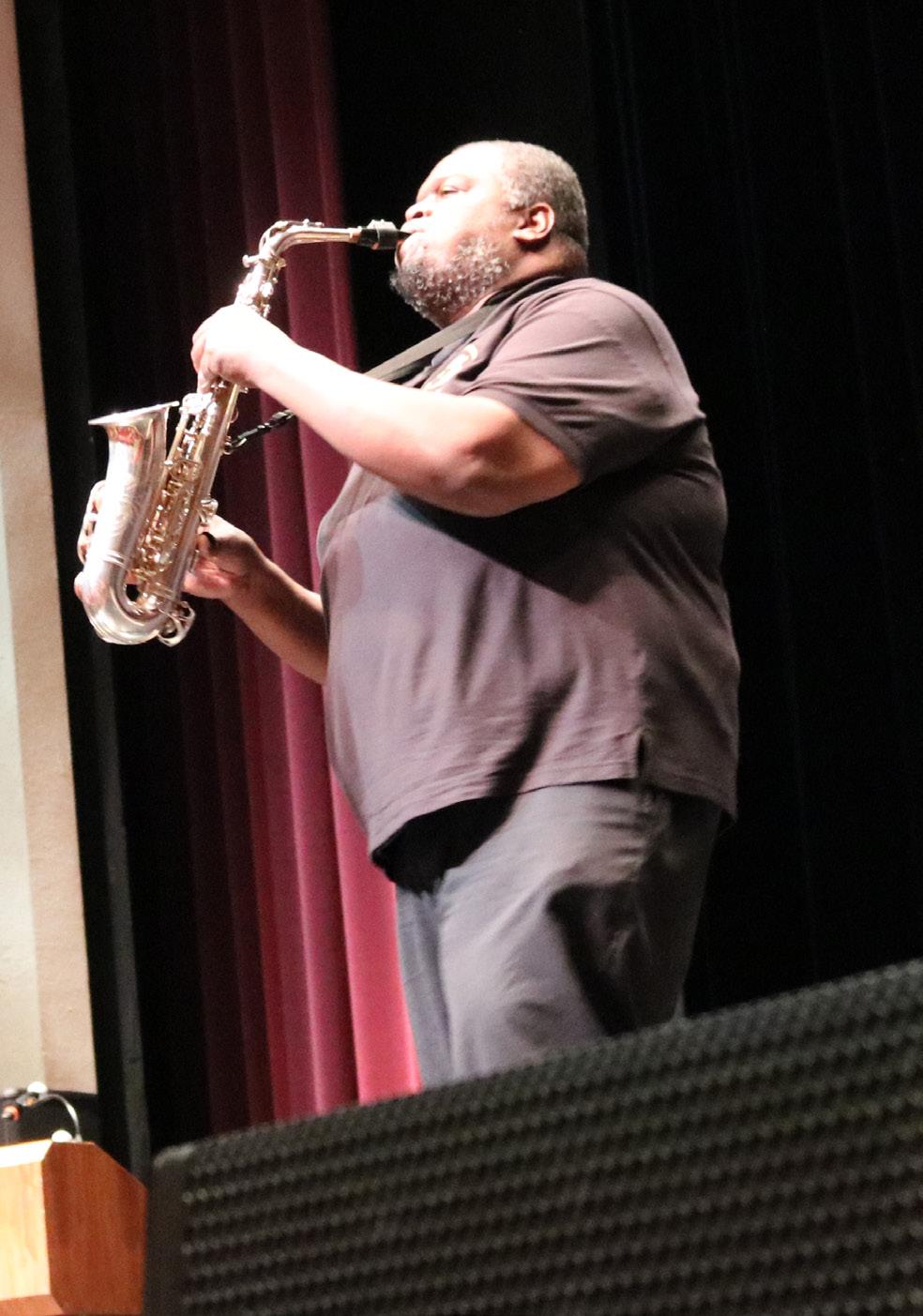
BY KAITLYNN BRANDON Staff Writer
This January, students faced long lines, answering machines, emails to the void and dropped communications from Delta faculty and systems.
A recent board meeting shows Delta is at least aware of the situation.
At the board meeting on Jan. 21, Board Trustee Vice President Charles Jennings pointed to the many job openings that are flooding the Delta website and job boards.
“Hopefully someone in HR has a spreadsheet of which positions are empty and for how long,” said Jennings.
Jennings suggested starting with filling custodial positions due to the growing number of cobwebs on Delta’s campus, as well as increasingly dirty building walls.
While Delta’s website only lists six jobs outside of ongoing part-time faculty recruitment as of Jan. 29, there is at least one vacant position in executive management.
The Vice President of Human Resources and Risk Management position is open after the resignation of Bradley Salters at the Dec. 17 board meeting.
LinkedIn shows that Salters is now Chief Human Resources Officer at the University of Mississippi. Board documents note that Salters was employed at Delta College for two years.
Board documents show other employees are receiving management stipends as a result of that resignation.
It is unclear how many people are currently working in the HR department, however, meeting minutes from the Board of Trustees meeting on Jan. 21, show that Angela Cotton, Director of Human Re-
sources and Risk Management, and Dana Kosaka, Director of Human Resources and Risk Management, saw a 10 percent Management Stipend for “Additional Duties in Absences of Vice President of HR.”
Dean of Communications and Languages Dr. Raman Deol was also granted a 10 percent management stipend for unspecified duties.
Information Technology Manager Stacy Bourret, Assistant Director of Information Technology Systems David Marciel, and Assistant Director of Systems Development Christopher Kirschenman were also given extensions of 10 percent management stipends for “Absence of the Executive Director of IT” according to the Jan. 21 board meeting.
Executive Director of Information Technology Scott Quick resignation was
approved by the board at the Sept. 10, 2024 board meeting, but wasn’t official until Dec. 1, 2024.
Robert Di Piero was granted a 10 percent management stipend for “additional duties” not specified, but as of Thursday, Jan. 23 Jim Bock was named Acting Chief of Police.
Collegian called Associate Vice President Dr. Lonita Cordova’s office to clarify Di Piero’s status and received an email in response from Director of Marketing and Communications Alex Breitler confirming Di Piero was on leave but providing no additional information.
“As this is a personnel matter, the College is unable to comment further,” said Breitler.
Collegian editor-in-chief Jelissa King contributed to this report.
BY ZACKARY KIRK-NEWTON Staff Writer
For those of a certain age, the concept of putting pencil to paper seems almost inextricable from the school experience. While that might be a thing of the past in most places, it has proven useful for at least one teacher.
Starting this semester, Professor Kathleen Gallup, who teaches English on the Delta campus will be changing her class to hopefully discourage the use of AI by students. Those changes come in the form of returning to good old-fashioned paper and pencil.
Her classes will now feature two major essays that will be done in class as a timed essay exam.
“I thought if I really forced their hand to actually create something in front of me, that maybe we could get over that hump — the procrastination, the lack of confidence,” said Gallup.
Students will be able to revise their essays afterwards, but the initial conception and planning will have to be done in class.
“It’s not a one and done,” said Gallup. “If they know that in the second phase of it, we’re gonna collaborate together, digitally, over a longer period of time.”
Gallup has been teaching for 35 years. In that time talking to students she believes she understands why students feel the need to lean on these tools.
“Students look for those kinds of

hope is that by having students work in person, the presence of AI will be limited.
shortcut tools when they are feeling under pressure, whether that be time management pressure or skills pressure,” said Gallup.
The relationship we have with this new technology has been a polarizing one, while for students these AI tools may be a GPA savior, for teachers they’ve been a grading nightmare.
“Plagiarism was always such a much easier thing [to catch] through Turnitin[.com]” said Gallup when asked what motivated her to make these changes. “It matches one to one”
AI use appears to be on the rise. According to a Turnitin.com survey of 2 million, 6 percent of papers were re-
ported as more than 80 percent AI content in march 2024
Towards the end of last semester, Gallup had spent hours at a time trying to figure out if an individual paper was using AI or not.
“On one paper, that I did sort of believe the student on last semester, we spent six hours on the one paper,” said Gallup. “I can’t spend six hours on every case.”
Gallup is not the only professor on campus who is struggling with AI use by students.
Tara Cuslidge-Staiano, professor of Mass Communication and Journalism, has seen a stark rise in AI usage over the
past couple of years.
“The first couple semesters I noticed it, I maybe had one or two, and now there’s six or seven in every class,” said Cuslidge-Staiano. “But it’s gone up, I would say significantly,”
While there are tools to detect AI, the approach to discipline across campus has not been uniform, and this has led to conflict.
“I’ve had students say to me, ‘well this teacher let me use AI’ and I say ‘great, that’s great for that teacher’ but in each class there are different policies,” said Cuslidge-Staiano. “I think unless we have an overarching AI policy, students are gonna keep coming back with that,”
This could change in the future, Delta established an AI task force in spring of 2024 that is currently looking into AI and its impact in the future, it has yet to influence policy but it will continue to meet going into the spring semester.
“For the time being, there are no specific AI-related policies in place at Delta College, though the College does have policies related to student conduct and discipline which would apply in cases of academic misconduct,” said Alex Breitler, Director of Marketing and Communications.
Editor’s Note: Tara Cuslidge-Staiano, who is quoted in this story, is advisor to The Collegian.
BY LEVI GOERZEN Feature Editor
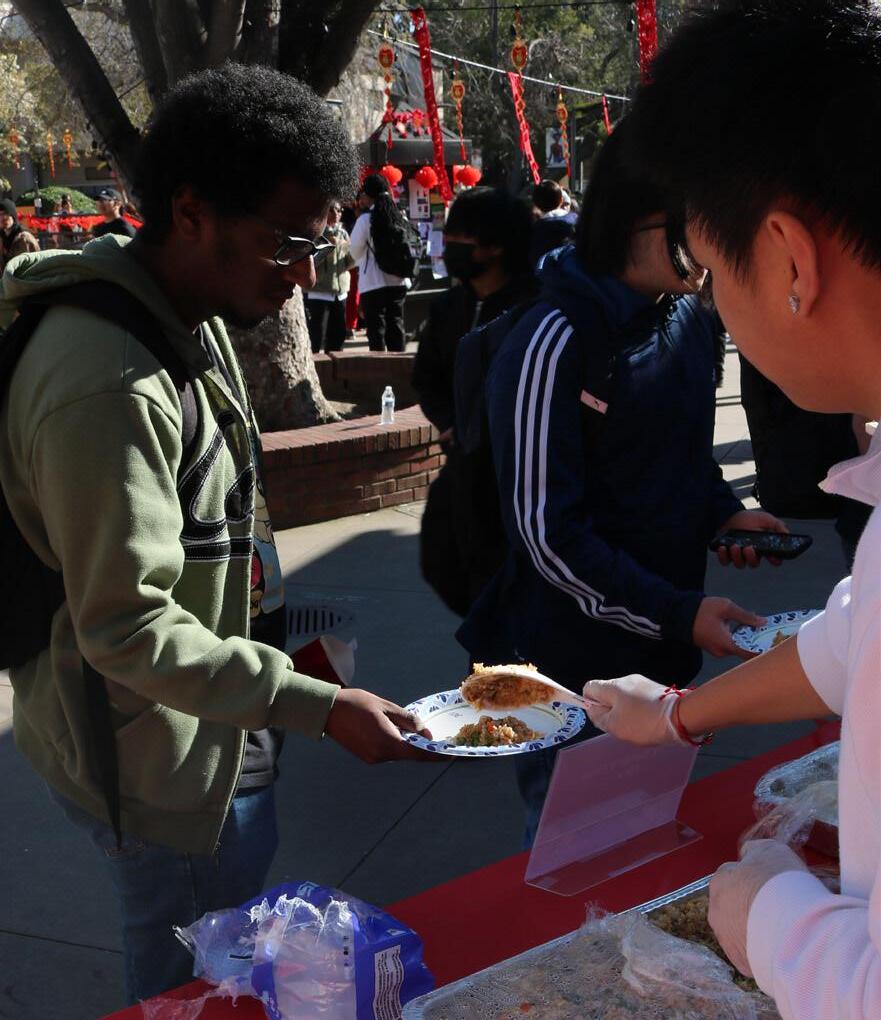

Above: Travis Vargchain serving food to Delta Student Yaseen Eltayeb at Delta’s Lunar New Year celebration on Jan. 28. Right: Delta Student Maroc Estrada decorating a fan at Delta’s Lunar New Year celebration on Jan. 28. Far Right: Delta Students Gary Winthrope and Aliaya Ai playing UNO at Delta’s Lunar New Year celebration on Jan. 28.
Below: Member’s of the EPIC club dancing at Delta’s Lunar New Year celebration on Jan. 28.

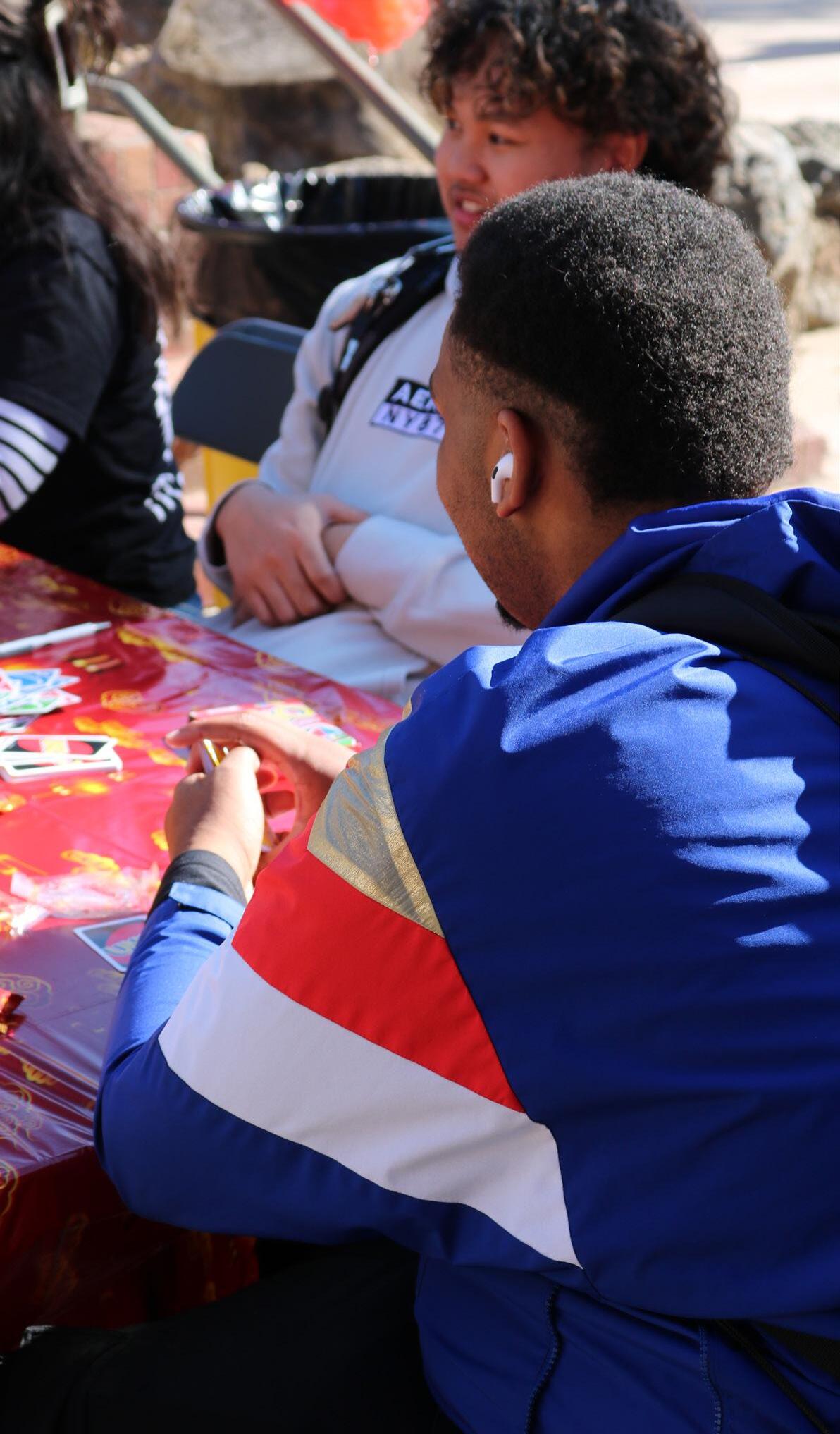

BY NADAR WILLIAMS Senior Staff Writer
The L.H. Horton Art Gallery at Delta College welcomed a large crowd to its Visual Poetry event reception on Jan. 23, as art lovers gathered to experience the beauty and creativity on display.
The event attracted families, students, and community members all eager to view the latest works by Delta College alumni and current students.
The gallery was filled with families and students, many of whom were excited to explore the new works.
One of the highlights of the evening was the display of works created in 2023 and 2024. Visitors had the chance to engage with contemporary pieces that reflected the struggles and triumphs of the artists.
Taylor Wick’s “The Weight of Resistance,” was a painting that grips the mind.
While Kimberly Juarez’s “Just Keep Building” offered an inspiring message of resilience in the face of adversity.
“This painting is incredibly detailed as well as surreal drawing me in with its layers of complexity,” said Delta student Jaylon Harris, “When I first glanced at it I appreciated the beauty of its technique. Once I really started to look at it again, I felt like there was deeper meaning in the painting. It's a statement that there's
beauty in illusion.”
“I was truly taken by the realism in this painting,” said Zaire Simpson,“The picture feels almost real, as if I could reach out and touch what I am seeing.”
The Visual Poetry reception not only highlighted the incredible talents of Delta College’s students and alumni, it allowed people to understand the gallery’s role as a vital space for artistic expression and collaboration.
In a world that often feels divided gatherings like the Visual Poetry reception offer a rare and valuable opportunity for individuals to come together, engage in meaningful dialogue, and experience.
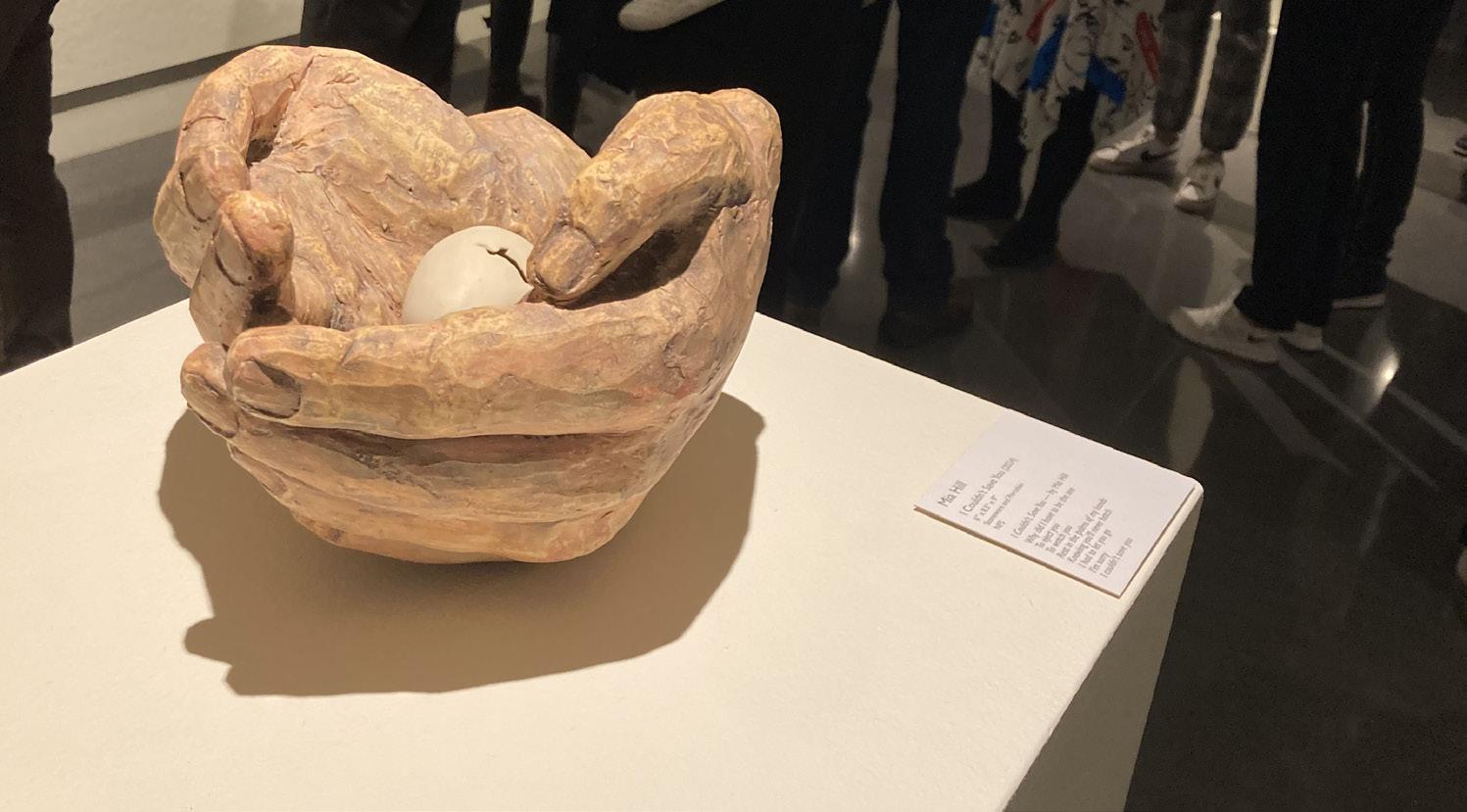
The event brought together a diverse group of attendee's alumni, students, faculty, and families united
by their shared appreciation for creativity and the power of art to inspire and provoke emotion.
If you want to experience art in person art will be on display until Feb. 13.
BY LEVI GOERZEN Feature Editor
The Associated Students of Delta College or ASDC, is Delta College’s student government. However many students aren’t entirely aware of the group's function.
“When you are an ASDC member you feel like a student and you feel like an employee you are kind of put in two worlds and it’s the most eye-opening experience a student can have,” said ASDC Vice President Layla Alaswald.
ASDC’s main function is to be a go-between for Delta College students and the administration.
“We actually have power since we represent 27,000 students,” said ASDC Secretary Ema Fua.
ASDC is overseen by the Office of Student Life and the Student Activities Director. Delta College is currently searching for a Director, the interim Director is Dr. Ricardo Marmolejo the Dean of Student Services.
ASDC is given a yearly budget of 100,000 dollars according to President Daniela Romo, limiting the
projects they can do.
Their most recent project was the re-opening of Locke Lounge as a multicultural center. Student Life is currently looking for a special programs assistant to help in the lounge.
“ASDC is trying to find a way to solve a big issue on a lot of students’ minds: transportation,” said Alaswald
ASDC attempted to work with rideshare services such as Uber and Lyft, however there were liability issues that halted the discussions. Delta used to have a partnership with San Joaquin Regional Transit District however it wanted to raise prices.
A project ASDC has done that many students have heard of is the food pantry. The food pantry opened on Jan. 28 this semester. The food pantry is available for all Delta College students who fill out the online Student Food Pantry application in MyDelta.
ASDC events are often held on Thursdays, including College Hour being held on the third Thursday of every month. The next college hour will be on Feb. 20 and will focus on Black History Month.

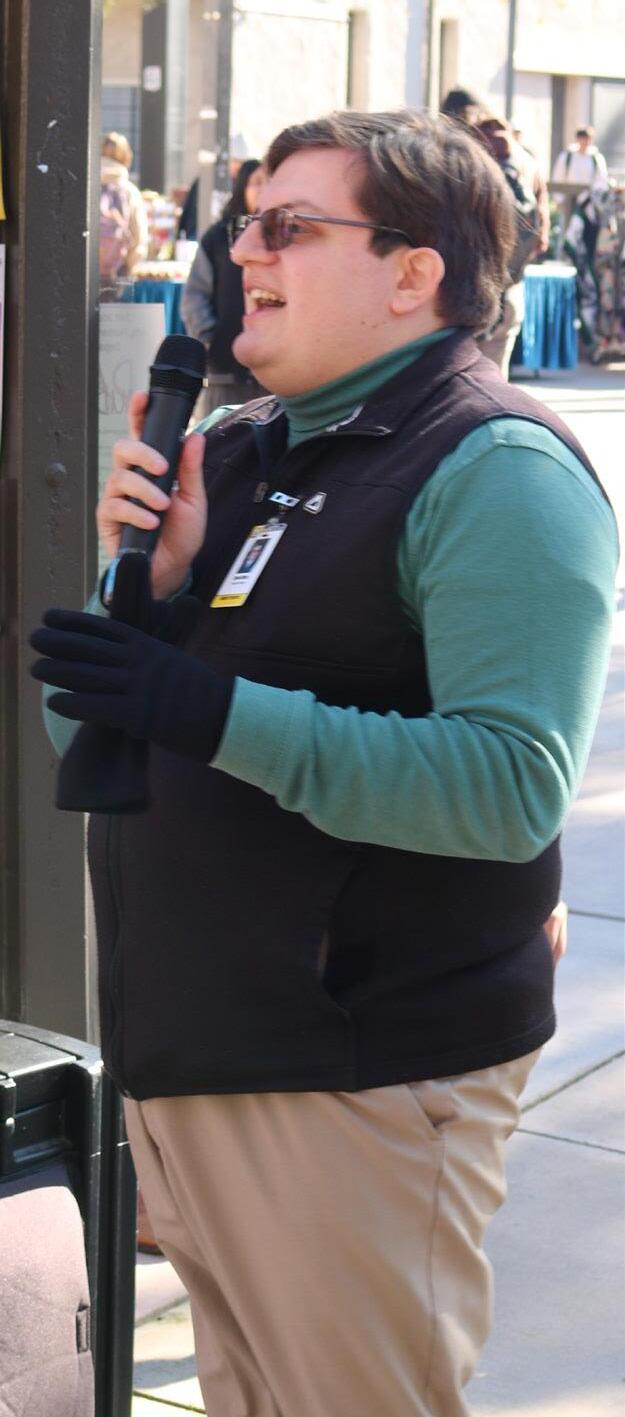
the camera panned over the jubilant crowd at President Donald Trump’s 2025 inauguration, I couldn’t help but feel the weight of America’s decision pressing down on me. My feelings are not just as an observer, but as someone whose life will be affected by the decisions of this administration.
I am a Nicaraguan immigrant under humanitarian parole, a journalist committed to exposing the truth and a woman navigating a world where my rights feel increasingly under threat.
For people like me, the day felt less like a celebration of democracy and more like a prelude to uncertainty.
I was still in Nicaragua when Trump got sworn in for his first term. I was only a teenager with zero understanding of politics.
In my household, political discussions were rare, and I was still figuring out my place in the world. Even so, Trump’s rise to power was impossible to ignore. His rhetoric about immigrants, branding them as criminals and threats, made their way to my house.
At the time, I didn’t fully grasp the consequences of his

with ANDREA BALTODANO
“Those shithole countries send us the people that they don’t want.”
Pres. Donald Trump, 2018
words, but I knew enough to feel disheartened by the lack of compassion they revealed.
It was during my years at a Jesuit university that my political awareness truly awakened. With a career path rooted in social justice and critical thinking, I developed a deeper understanding of human rights, democracy and the importance of standing against injustice.
I identified Trump as an embodiment of everything I would never support: intol-
erance, inequality, and the prioritization of power over people.
In 2018, Nicaragua faced a nationwide uprising sparked by social security reforms, with my university, Universidad Centroamericana (UCA), at the heart of the movement.
I joined my friends and classmates in protests, many of whom were later convicted as political felons. After spending a year in Costa Rica for safety, I returned to Nicaragua, only to face new threats when the government took over UCA and accessed my student records.
With my safety at risk, I was granted humanitarian parole, a temporary residence program that would give me the chance to rebuild my life in the United States, free from the fear of political persecution. Now, that lifeline is under threat.
Trump has vowed to eliminate humanitarian parole and has targeted the asylum process, which I have already begun since returning to Nicaragua is not an option.
Trump pledged to use “all available resources and authorities to stop this unprecedented flood of illegal aliens into
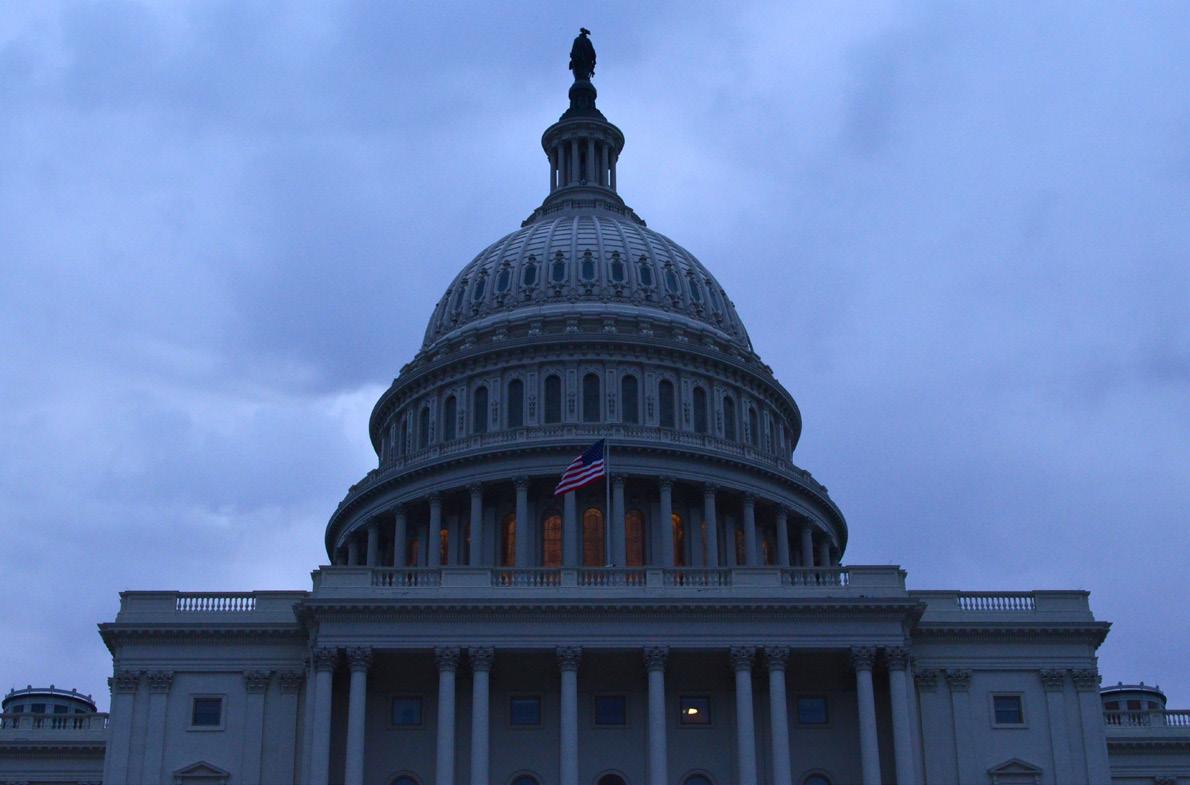
the United States,” according to the “Secure Our Borders” Executive Order released on Jan. 20 2025 on the White House website.
His words leave me with a haunting question: what’s next for me?
As “Hallelujah” echoed across the crowd and fireworks lit up the Washington, D.C. sky, a familiar feeling crept over me. It was the same feeling I had when I first heard about ICE raids in Kern County weeks ago, tearing apart families and deporting hardworking people. Is it fear?
Frustration? Disappointment? I don’t know.
I do know this: if I didn’t surrender in Nicaragua, I won’t surrender here either.
Truth must be spoken. Leaders must be held accountable. Democracy can’t be revoked. No matter how uncertain the road ahead feels, I will continue to stand up, not just for myself, but for all those who deserve to be seen, heard and protected.
Because if we stop fighting now, what will be left of the freedom we came here seeking?
BY KAITLYNN BRANDON Entertainment Editor
Personalhygiene tools can be harmful or injurious, and can even land people in the hospital in extreme cases.
Loofahs can carry bacteria, shared razors can spread infection and parabens can affect estrogen levels.
Yet, many of these products are still widely used, despite the dangers.
One such product is the cotton swab.
Invented in 1923 by Leo Gerstenzang after he saw his wife
cleaning their baby’s ears with a toothpick and cotton, cotton swabs became a staple of the bathroom counter nation wide.
Cotton swabs can work to clean gunk from the ear canal, but if inserted too deep, can push that gunk farther into the ear causing earwax impaction, or scratching the delicate skin of the ear canal, inviting infection.
Fareeda Hussain M.D., an Otolaryngologist and head and neck surgeon, wrote for the Mayoclinichealthsystem.org about the dangers of cotton swab use.
Hussain warns that it is never a

good idea to put any small objects into the ear canal because it can cause earwax impaction and “can traumatize the fragile ear canal skin and lead to infection and bleeding.”
For those still keen to clean those waxy canals, alternatives can include: hydrogen peroxide and oil, or sinus irrigation systems such as a Neti Pot, but Hussain advises it’s best to speak with your healthcare team about earwax removal concerns.
Maybe it’s time to leave the cotton swab in the 21st century.
BY ANDREA RIVERA Editor-in-Chief
Restartingis a funny thing, and we as a society have long loved a good New Year’s resolution. A New Year’s resolution is “a promise to do something differently in the new year,” according to Webster’s Dictionary.
As humans we are doomed to repeat and quickly fail from temptations, laziness or accountability. After all, we’re only human.
Student Angelina Nguyen knows that feeling of laziness creeping up but says that it won’t stop her.
“Just persisting even though I’m not in the mood to do it helps me reach higher heights,” she said.
I myself have fallen prey to that, promising over many years and set resolutions that I would complete no matter what, but I let obstacles get in the way.
For example, being hopeful I would go to the gym more, keep my room clean or actually dress up in casual nice clothing instead of wearing athleisure everyday.
Even going as far as saying I would turn in articles, such as this one, on
time — regardless of if it meant staying up past midnight to finish.
If you knew me… You’d have clearly seen I let barriers get in my way and was only successful in completing one of those things. And it wasn’t the articles.
For student Angel Delauz his struggle was “discipline. I wasn’t really disciplined and I would procrastinate a lot more. And now-a-days, you know, I’m just sticking to it and just riding it out.”
But don’t be discouraged because New Year’s resolutions have been around for a lot longer than you think and we all have been in that same position of riding it out and taking it day-by-day.
National Geographic says that back in the first millennium B.C., a Babylonian king had publicly vowed to be a better ruler.
Now whether this happened and he was successful is up for discussion, but it laid the groundwork for the Romans to pick up the trend and incorporate it into the tradition of resolutions yearly like cleaning homes, stocking the pantry, paying off debts and returning borrowed items.
According to Baylor College of Medicine 88 percent of people who set New Year’s resolutions fail before the end of January and by the second Friday in January, known as “Quitter’s Day,” most of the population give up on their resolutions.
Sound familiar?
Student Cesar Rosas is not letting the stigma of failing his resolution stop him. Rosas is going to continue to become an Indie filmmaker and already has an entire crew to help him.
“Sometimes the challenge gets in my head a little bit… We all start off small and you got to work your way up there. No matter how long it takes, you’re eventually going to reach that goal.”
Although if you’re like me — hopeless and with commitment issues — here are some tips for sticking to your New Year’s resolutions.
Many people will set mini goals in between the bigger picture to reach it. It will also help you celebrate and keep your optimism
high knowing you’re one step closer.
Having an accountability partner is super helpful too. We all get lonely and discouraged at times but having a friend or community to motivate us and remind us of our goal incites a liveliness.
And despite the fact we all think that reinventing ourselves has to start at the beginning of the year, it can happen at any time.
Change doesn’t happen overnight and we should focus on learning about ourselves while creating better habits that will stick with us through time.

BY KAITLYNN BRANDON Entertainment Editor
Luigi Mangione sparked controversy last December when he gained notoriety for alleged involvement in the killing of UnitedHealthcare CEO Brian Thompson.
Once Mangione was announced as the main suspect, Social Media did the rest, spreading his face all over the internet, and declaring him an attractive assassin for the people. A modern Robin Hood of the Health Industry.
Posting their brand new Mangione tattoos, video edits and even fanfiction, supporters celebrated a perceived victory against a healthcare monopoly.
Meanwhile, Mangione detractors took to blog posts
and YouTube comments with concerns, not just for morality but for order. Many were appalled at the jubilee, and worried that this could inspire more violence.
What drives this Mangione Mania?
Could it be a symptom of a bigger problem?
One rich kid from Baltimore allegedly murdering a CEO because of chronic back pain would not have sparked such a controversy if tensions surrounding healthcare weren’t already so high.
Governor of Pennsylvania Josh Shapiro, the state where Mangione was apprehended, addressed the controversy in a media interview.
“This is not what we do in a civilized society,” said Shapiro.
But is a society civilized if its citizens are suffering,
dying, and unable to afford to pay for life saving care?
Counter arguments ask why Thompson’s murder is worthy of more sympathy than the genocide of indigenous Americans, or the victims in Gaza, or especially relevant, those dying because of the health care they have been denied?
Deny. Defend. Depose. The “Three D’s” of healthcare, a reported strategy, where services needed by the insured are delayed, denied, and finally defended in court. . The unfortunate reality is most of those denied care can’t afford, or do not have the life expectancy to go to court.
Many have suggested a book “Delay, Deny, Defend” , a book by Legal Scholar Jay Feinman, influenced Mangione, as allegedly, written
on shell casings at the crime scene where the words deny, delay, depose. The last word is notably different, suggesting the shooter may have believed the goal of the three D’s strategy was meant to end in the deaths of applicants.
While Mangione’s Good Read’s account was reportedly discovered by Social Media armchair investigators, which if true, screenshot show a well read individual Feinman hasn’t been directly tied to being one of Mangione’s inspirations, but documentarian Michael Moore was, as well as author of An American Sickness, Elizabeth Rosenthal, both of whom were mentioned directly in Mangione’s handwritten manifesto as those who should be referenced when attempting to under -
stand the corruption and greed of America’s healthcare system.
Moore wrote a response, in an article on MichaelMoore.com where he calls for a full overhaul of the healthcare system.
Also in Mangione’s manifesto, which was publicly released but is unavailable for reading online, states that he is “the first to face it [corruption and greed] with such brutal honesty” and in this quote might be found the real basis for the mania.
Americans are tired of the lying politicians, the out of touch advertisements, and the large corporations dragging out insurance until people die. The happy faces on TV looking out while real American’s face homelessness and starvation is the stuff of dystopian novels.

BY ANDREA BALTODANO Staff Writer
BadBunny isn’t just breaking records; he’s breaking boundaries. Known for his defying sound and unapologetic authenticity, the Puerto Rican singer has risen to global fame not just by dominating the reggaeton and trap scene, but by reshaping it to send a message.
In a genre focused on party anthems, wealthy lifestyles, and sensual rhythms, Bad Bunny stands apart, using his platform to amplify the voices and issues his homeland is“LOfacing.QUE LE PASÓ A HAWAii” is a song from Bad Bunny’s fifth studio album, released on Jan. 5 called “DeBÍ TiRAR MáS FOToS”.
The song holds a direct complaint: “Quieren quitarme el río y también la playa,” referring to the exploitation of Puerto Rico’s natural resources, as corporate greed threatens to privatize the island’s beaches and displace local communities. This is due to Act 60, a law aimed at boosting Puerto Rico's economy.
Under this Act passed in July 2019, eligible individuals can avoid taxes on long-term capital gains from investments made after establishing residency. The law allows foreign investors to reduce their income taxes to as little as 0 to 4 percent.
“This act has only deepened marginalization, displacement and socioeconomic inequality and has helped turn the island into a tax haven for the rich," said Rep. Nydia Velázquez, D-N.Y in a letter sent to the IRS back in Nov. 2023.
BY KAITLYNN BRANDON Staff Writer
Lately,you can’t throw a stone without hitting another soulless wad of soiled cash grab known as the 2020s movie remake or spin off.
Adding nothing of substance to the original work, these rehashed scripts are plundering already shallow pockets with the promise of nostalgia, but the CGI is beige and poorly rigged, live action is cast based on current popularity, and the scripts jump sharks like they’re running hurdles.
Of the CGI “Lion King”
Hawaii and Puerto Rico share similar histories of colonialism and cultural loss. Hawaii, once a sovereign kingdom, was overthrown and annexed by the United States in 1898, becoming a tourist state neglecting its native people and traditions. That same year, Puerto Rico was ceded to the U.S. after the Spanish-American War, and in 1952 it was legally proclaimed a U.S. com monwealth under President Harry Truman.
As tourism expands, locals are being priced out, raising concerns that Puerto Rico could follow Hawaii’s path, becoming a destination that prioritizes visitors over its own communities.
In an interview with Time magazine, Bad Bunny re flected on the disconnect between outsiders and Puerto Rico’s realities. “Politically and historically, they know nothing about Puerto Rico, nor are they interested in knowing,” he said. “They don’t even know that Puerto Ricans on the island don’t even vote for the president, but they do know that they can go to the island to legally evade taxes. That’s something that shocked me.”
“LO QUE LE PASÓ A HAWAii” stands as a power ful reminder that music can be a tool for resistance and reflection. By exposing Puerto Rico’s biggest challenges into his lyrics, he highlights the urgent need to protect the island’s land, culture, and people from exploitation and neglect.
His message is clear: Boricuas must stand united to prevent their homeland from becoming just another star on the American flag. By protesting, Bad Bunny isn’t just reshaping reggaeton, he’s giving Puerto Rico a voice on the world stage.

spinoff, “Mufasa,” Director of Marketing and Communications Alex Breitler said “I’m not philosophically opposed to it, but it’s never gonna be the real thing. You can make it beautiful, but that doesn’t replace good story telling. Original story telling.”
The worst of it is that the general opinion of these remakes is that they have potential that is being squandered.
“I feel like they could be good, it just depends on what the movie is, like how you guys are remaking it,” Said Delta student Kah’lea Rogers.
Remakes aren’t always negative. For instance, fairy tales are very commonly remade to
update the story for modern crowds. Rodgers & Hammerstein’s “Cinderella,” with Brandy and Whoopi Goldberg was remade into a world where racial discrimination did not exist, creating a light fantasy story that everyone could enjoy.
The difference between this movie and newer remakes is creative risk.
And what about adaptations? Comic book movies? Are there original movies being made now that take the monetary risk that comes with creative innovation?
Indie studios are.
Movies like Studio A24’s “The Legend of Ochi,” an
original fantasy with practical effects, and puppets are bringing original scripts back to the movie industry, while also reminding everyone that there is a movie industry outside of Hollywood.
Better movies require a demand for quality and originality, and the public can express that through views, so data collections will show where the true interest is.


BY JOE DEMASI Sports Editor
On Jan. 21, the Mustangs beat Folsom Lake Falcons 75-68 in a conference home game. With the win, Delta moves to 7-13 and 3-5 in conference play.
Instead of being played in 4 quarters the game was played in two 20 minute halves.
The Mustangs remained in the lead throughout the first half but Folsom kept it close, however, the team stepped up big defensively at the end of the half.
The Mustangs had confidence going into the halftime with a lead of 13 points.
Head Coach Rich Ressa said he felt the team executed well and praised the defense.
“The scout was to guard two really good players, one could shoot it and one could put it on the ground,” he said. “The defense did really well, I felt that when their better players were driving we helped very well and we got out in transition which included better offensive rebounding too.”
Ressa says the team has the confidence to play with the best of the Big 8 conference.
At the beginning of the second half Folsom Lake cut the lead to 4 points but after regrouping the Mustangs got it together.
Guards No. 3 Lorenzo Leonard and No. 10 Joey Fross led the team in scoring with 15 points.
Fross came off the bench and provided a great scoring spark making 5 of his 8 shots.
Starters Leonard and No. 4 Andruw Galindo facilitated the offense and made great plays scoring and passing.
Fross said he enjoys his role and that communication is key.
“Me and the coaches have discussed my role and I feel like it is good for me and I’ve been able to stay productive through it. We just have to keep playing hard, keep trusting each other, keep swinging the rock and communicating as a team.”
Freshman Center No. 23 Dwight Strickland provided good rebounding and scoring off of the Mustangs misses. He had multiple blocks and was able to make his free throws throughout the game.
Strickland had 10 points and 15 rebounds and Galindo had 8 points with 3 assists and a steal.
With two minutes left No. 12 Donovan Saiyad hit two clutch shots making the lead 11 and sealed the win for the Mustangs. The game ended with free throws for each team.
Galindo said it felt good to remain in the lead throughout the game
“It’s still mid-season so any win is good for us right now. It helped our confidence that we led so big in the first half. I just had to do what I could offensively, it’s all about the team at this point, I will do whatever I can do to help the team.”
Throughout the month, The Mustangs will be playing in a lot of conference games.
Above: No. 23 Dwight Strickland makes his first free throw attempt in the first half.
Below: No. 10 Joey Fross makes 3-pointer making the lead 7 points.
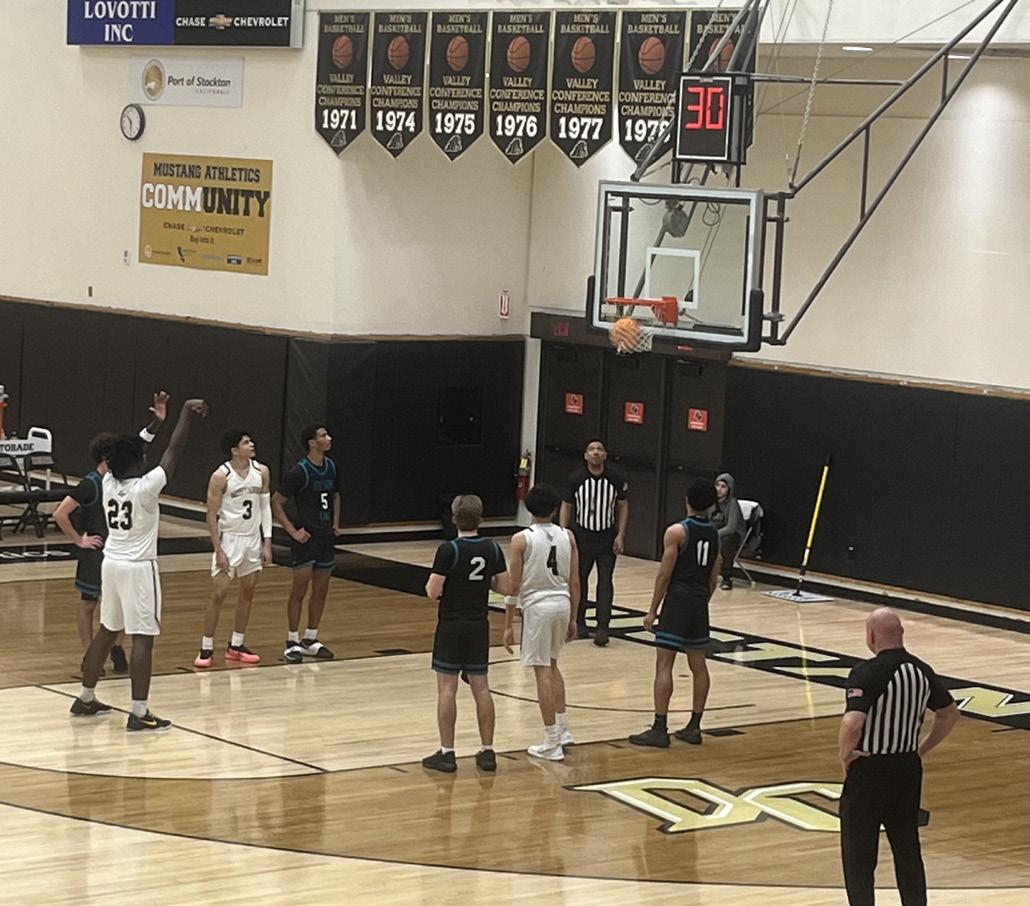

BY LEVI GOERZEN Feature Editor
BY JOE DEMASI Sports Editor
With the spring semester starting that means that some sports are over and new sports are starting.
Upcoming men’s sports are baseball, golf, swimming and track and field.
Upcoming women’s sports are beach volleyball, softball, swimming and diving, wrestling and track and field. While swimming and diving are both women’s and men’s sports, Delta has no male divers for the 2025 season.
Men’s and women’s Basketball are also ongoing as they are Winter sports.
Delta women’s basketball is currently on a 5-win streak putting them at 14-7 overall and 8-1 in conference, tying them for first with Folsom Lake. Delta is averaging a 38.7 percent field goal percentage, 26.8 percent Three-Point percentage and 70.9 points per game.
“Through November and December we had a lot
of injured and sick players while we played the best teams in California,” said women’s basketball coach Gina Johnson.
The men’s basketball team is currently 7-14 overall and 3-6 in conference, putting them at 7th in the Conference. Delta is averaging a 41 percent field goal percentage with a 27.5 three-point percentage and 68 points per game.
The baseball and softball fields are currently undergoing maintenance, however, that should change this semester.
“I’m excited, we should be back on campus in March and April for softball and baseball,” said Athletic Director Tony Espinoza.
If you want to catch a Delta softball or baseball game before then, they are currently played at the University of the Pacific.
The baseball team in specific is going through major change.
After finishing second in state, Elite Head Coach Reed Peters left for University of Pacific after 17 years at Delta and the baseball team saw 23 transfers.
Delta named Bob Kittle as interim head coach for
this season. Kittle was the pitching coach last year and his pitching staff ranked fourth best in terms of ERA. (Earned Run Average).
Kittle says that being pitching coach prepared him to take over the helm and praises Peters.
“Coach Peters is the Nick Saban of CA JC baseball, so you don’t replace someone like that. I was fortunate to work with him and get an understanding on why Delta baseball is so elite,” he said “We will always maintain and keep the core principles of D Squad as it is a tried- and-true system. Its a great honor to take over this machine Delta College Athletics and Coach Peters manufactured”.
Kittle also speaks on not having a home field on campus and the teams goals for the season.
“We have been on the road for 3 years now and it’s not even a factor as evidenced by last year’s run. We are excited to be the 1st team to play on the re-done field, but in the time being we are happy to be able to compete and play wherever,” Kittle said “As always. Delta Baseball has the exception to win a state championship and this years team is more then capable of accomplishing that goal.”